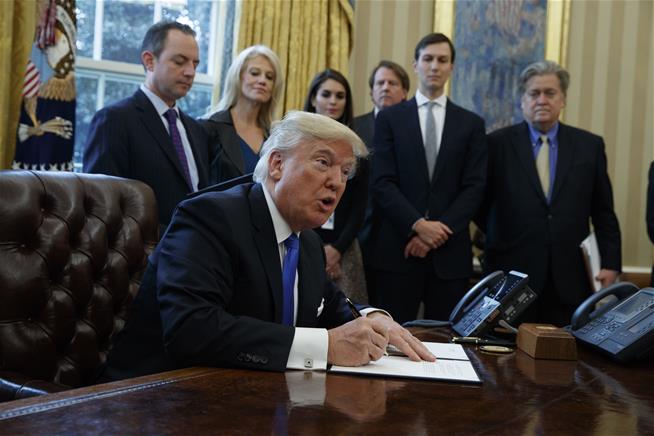Trump Keeps Campaign Promises Through Executive Order
This week's cover story.
January 31, 2017
Since taking office, President Donald Trump has signed 17 executive orders. This first week, President Trump’s orders went from authorizing the constructing a wall along the US-Mexico to the continuation of the installation of the Keystone XL and Dakota Access pipelines to banning refugees and residents from seven Muslim-dominate nations.
These executive orders, many which were campaign promises made by the President, continue to stand controversial.
Sophomore Nelson VanDenburg’s believes these steps taken to increase border security is necessary.
“A lot of people would consider it racist to build a wall but I believe that there is nothing racist about increasing border security. It’s not that President Trump wants to keep Mexicans from coming in, but he wants them to come in legally. He wants to keep drugs out of the country and further increase the wellbeing of the US.”
On Friday, President Donald Trump signed an executive order banning all immigrants and visitors from seven Muslim-dominated countries: Iraq, Syria, Iran, Libya, Somalia, Sudan and Yemen.
The executive order states, “numerous foreign-born individuals have been convicted or implicated in terrorism-related crimes since September 11, 2001, including foreign nationals who entered the United States after receiving visitor, student, or employment visas, or who entered through the United States refugee resettlement program.”
However, many Americans have expressed an unsettling feeling – since September 11, no one has been killed in this country in a terrorist attack by anyone who emigrated from these countries. The question then arises on whether or not more countries should be added to the list or perhaps the order is ineffective altogether.
Junior Allison Smith works with Integrated Refugee & Immigrant Services (IRIS), an organization that works with resettling refugees among Connecticut and holds a strong opinion regarding the banning of refugees.
“Immigration resettlement is not instant how everyone thinks. Some families wait 5-8 years to come here in countries that are not safe,” said Smith. “Probably the most concerning part as a student here is that we have a very large international population. A lot of the students that go here are from these countries. What does that mean for them? What does this mean in terms of them going home or seeing their family?”
Other students expressed similar concerns. Sophomore Mackenzie Smilie said, “I think it will cause a lot of uprisings. In my opinion, the majority of Americans don’t agree with it. We definitely will be seeing a lot more protests and I don’t think they will necessarily be peaceful. A lot of people will be affected. I think this goes against what America stands for. We are a nation built on immigrants.”
Only a little over a week into his presidency, President Trump has provided a preview of the new American agenda for the next four years preparing the country to what some may see as forwards, and to others, backward.

